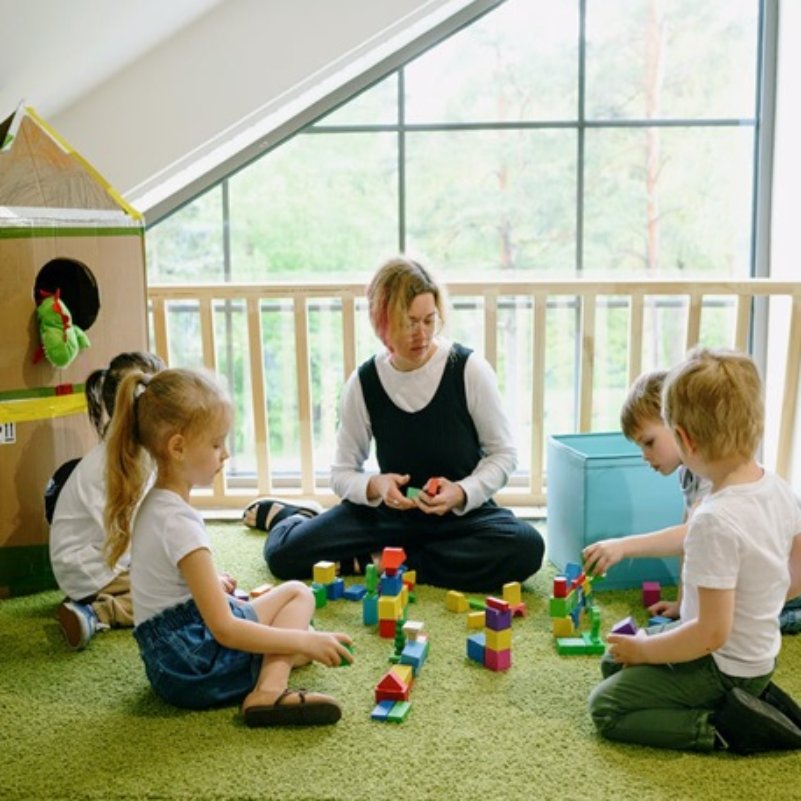Here are a few activities that you could do with your child to develop your child’s brain and gross motor skills in a fun way.
- Building with blocks: Encourage your child to build towers, castles, and other structures using wooden or plastic blocks. This helps with fine motor skills, problem-solving, and creativity.
- Painting and drawing: Provide your child with crayons, markers, paint, and paper to explore their artistic side. This helps with fine motor skills, creativity, and self-expression.
- Outdoor play: Take your child to the park, playground, or backyard to play with balls, frisbees, or other outdoor toys. This helps with gross motor skills, coordination, and socialization.
- Pretend play: Provide your child with dress-up clothes, kitchen sets, and other props to encourage pretend play. This helps with the imagination, creativity, and socialization.
- Reading: Read to your child daily to help with language development, vocabulary, and comprehension.
- Music: Introduce your child to different types of music and encourage them to sing along or dance. This helps with rhythm, coordination, and self-expression.
- Puzzles: Provide your child with simple puzzles to solve. This helps with problem-solving, fine motor skills, and concentration.
- Scavenger hunt: Create a scavenger hunt for your child to explore their surroundings and find items on the list. This helps with problem-solving, observation, and teamwork.
- Science experiments: Do simple science experiments with your child, such as making a volcano, creating a baking soda and vinegar reaction, or observing a plant's growth. This helps with curiosity, problem-solving, and observation.
- Cooking: Allow your child to help you in the kitchen and teach them basic cooking skills. This helps with fine motor skills, math, and following instructions.
Tips and Tricks for Making it Fun and Exciting
While not all children are like this, some need to be given special care and attention to open up or engage in sports and other activities. In that case, you could use some tips and tricks on making these activities fun and exciting for your little one to grow. This way, they will be enthusiastic and eager to participate.
- Incorporate imagination: Encourage your child to use their imagination during playtime by giving them open-ended toys such as blocks, dolls, or action figures. This allows them to create their own stories and scenarios.
- Introduce new activities: Keep playtime fresh and exciting by introducing new activities such as crafts, puzzles, or games. This can help to keep their attention and spark their curiosity.
- Play together: Spend time playing with your child and participate in their playtime. This can help to strengthen your relationship and create fun memories together.
- Create an engaging environment: Set up an inviting and engaging play area with colorful and interesting toys, books, and games. This can help to spark your child's imagination and encourage them to play.
- Encourage outdoor play: Get outside and play together in nature. This can be a great way to explore the world around them and get some exercise.
- Dress up and role-play: Encourage your child to dress up and act out different roles. This can be a fun way to explore different emotions and express themselves.
- Set challenges and goals: Set small challenges and goals for your child to achieve during playtime. This can help to keep them engaged and motivated.
- Make it fun: Make sure to keep playtime fun and light-hearted. Avoid putting too much pressure on your child and let them have fun and explore at their own pace.
Playtime Activities for Child Development
During playtime, children can engage in a variety of activities such as playing with toys, building with blocks, playing games, and participating in outdoor activities. These activities help children to develop their fine and gross motor skills, learn about cause and effect, and explore their creativity.
Playtime also provides opportunities for children to develop their social and emotional skills. Children learn how to share, take turns, and work together through interactive play. They also learn how to express their emotions and communicate with others.
As children grow, their playtime activities should become more complex and challenging. This allows them to continue to develop their skills and interests. Parents and caregivers can support this development by providing a variety of age-appropriate toys and activities, and by encouraging children to explore and try new things.
In summary, playtime is an important part of a child's development, providing opportunities for them to learn, explore, and grow. Parents and caregivers need to provide a variety of age-appropriate activities and support children in their playtime endeavors.

